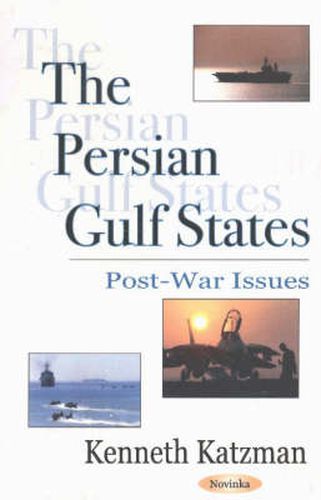Readings Newsletter
Become a Readings Member to make your shopping experience even easier.
Sign in or sign up for free!
You’re not far away from qualifying for FREE standard shipping within Australia
You’ve qualified for FREE standard shipping within Australia
The cart is loading…






The Bush Administration has said that the fall of Saddam Hussein’s regime in April 2003 will ease the security challenges the Persian Gulf region faces. The US-led war has ended Iraq’s ability to produce weapons of mass destruction (WMD) and virtually ended any Iraqi conventional military threat to the region. However, some of the Persian Gulf states (Saudi Arabia, Kuwait, Bahrain, Qatar, Oman, and the United Arab Emirates) fear that Iraq might no longer serve as a strategic counterweight to Iran and they fear that pro-Iranian Shiite Muslim groups might obtain a major share of power in post-war Iraq. Substantial administration concern remains about Iran’s WMD programs, particularly what appear to be rapid advances in its nuclear program, and the potential for Iran to transfer that technology or materiel to the terrorist groups it supports. Over the longer term, with Iraq no longer a major power and the United States likely to sharply reduce its Gulf presence once Iraq is stabilised, the Gulf states might try to fashion a new security architecture for the Gulf that is based more on regional states and less on the United States. On the other hand, a reduction of the U.S. military presence in the Gulf might benefit the Gulf states by easing internal opposition to close co-operation with the United States. This new book presents the latest issues of the post war Persian Gulf states.
$9.00 standard shipping within Australia
FREE standard shipping within Australia for orders over $100.00
Express & International shipping calculated at checkout
The Bush Administration has said that the fall of Saddam Hussein’s regime in April 2003 will ease the security challenges the Persian Gulf region faces. The US-led war has ended Iraq’s ability to produce weapons of mass destruction (WMD) and virtually ended any Iraqi conventional military threat to the region. However, some of the Persian Gulf states (Saudi Arabia, Kuwait, Bahrain, Qatar, Oman, and the United Arab Emirates) fear that Iraq might no longer serve as a strategic counterweight to Iran and they fear that pro-Iranian Shiite Muslim groups might obtain a major share of power in post-war Iraq. Substantial administration concern remains about Iran’s WMD programs, particularly what appear to be rapid advances in its nuclear program, and the potential for Iran to transfer that technology or materiel to the terrorist groups it supports. Over the longer term, with Iraq no longer a major power and the United States likely to sharply reduce its Gulf presence once Iraq is stabilised, the Gulf states might try to fashion a new security architecture for the Gulf that is based more on regional states and less on the United States. On the other hand, a reduction of the U.S. military presence in the Gulf might benefit the Gulf states by easing internal opposition to close co-operation with the United States. This new book presents the latest issues of the post war Persian Gulf states.